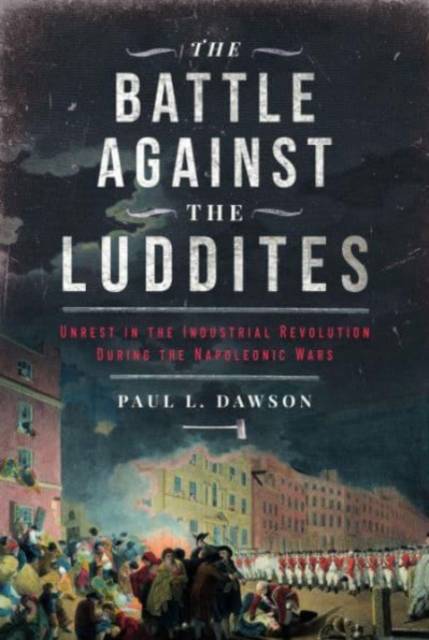
Bedankt voor het vertrouwen het afgelopen jaar! Om jou te bedanken bieden we GRATIS verzending (in België) aan op alles gedurende de hele maand januari.
- Afhalen na 1 uur in een winkel met voorraad
- In januari gratis thuislevering in België
- Ruim aanbod met 7 miljoen producten
Bedankt voor het vertrouwen het afgelopen jaar! Om jou te bedanken bieden we GRATIS verzending (in België) aan op alles gedurende de hele maand januari.
- Afhalen na 1 uur in een winkel met voorraad
- In januari gratis thuislevering in België
- Ruim aanbod met 7 miljoen producten
Zoeken
The Battle Against the Luddites
Unrest in the Industrial Revolution During the Napoleonic Wars
Paul L Dawson
Hardcover | Engels
€ 34,95
+ 69 punten
Omschrijving
As the columns of French infantry marched up the slopes of the Mont St Jean at Waterloo, the British heavy cavalry, the Royal Scots Greys to the fore, crashed into the packed ranks of the enemy. This was not the first time the Greys had drawn their swords during the Napoleonic Wars - but it was their first against Napoleon's troops. Three years earlier they had attacked workers in Halifax protesting at the introduction of machinery in the wool trade.
Taking their name from Ned Ludd, who had smashed up knitting frames in Nottingham, the Luddites saw the emergence of mechanization as a threat to their livelihood, with machines replacing men. In response they took matters into their own hands by wrecking the new equipment.
Industrial unrest had gathered pace throughout the 18th century and exploded in an unpresented wave of violence in 1799. Outbreaks of machine-breaking developed rapidly into strikes in a battle of capital against labor. A court battle ensued, culminating in new legislation in 1806 that backed the capitalists. This act, coupled with the impact of the Continental system introduced by Napoleon, which closed European and American ports to British merchants, heralded the largest economic depression of the era. Famine, pestilence and rising employment all fueled the fires of Luddism.
Months of violence swept across the West Midlands, Lancashire and Yorkshire which saw one factory boss murdered; other factory owners began shooting protesting workers. The disturbances resulted in the mobilizing of thousands of regular soldiers - at one time there were as many British soldiers fighting the Luddites than there were fighting Napoleon on the Iberian Peninsula.
As well as exploring these events, Paul L. Dawson also uncovers the origins of Luddism and their allies in the middle classes. The Napoleonic Wars marked the end of centuries old way of life in agriculture, textile production and the wider economy.
The dramatic changes in Britain between 1790 and 1815 created a unique set of social grievances by those left behind by the unprecedented changes that were surging through the Britain which exploded into bitter fighting across large swathes of the country. With present day concerns over computerization replacing labor, this is a story that echoes down the centuries.
Taking their name from Ned Ludd, who had smashed up knitting frames in Nottingham, the Luddites saw the emergence of mechanization as a threat to their livelihood, with machines replacing men. In response they took matters into their own hands by wrecking the new equipment.
Industrial unrest had gathered pace throughout the 18th century and exploded in an unpresented wave of violence in 1799. Outbreaks of machine-breaking developed rapidly into strikes in a battle of capital against labor. A court battle ensued, culminating in new legislation in 1806 that backed the capitalists. This act, coupled with the impact of the Continental system introduced by Napoleon, which closed European and American ports to British merchants, heralded the largest economic depression of the era. Famine, pestilence and rising employment all fueled the fires of Luddism.
Months of violence swept across the West Midlands, Lancashire and Yorkshire which saw one factory boss murdered; other factory owners began shooting protesting workers. The disturbances resulted in the mobilizing of thousands of regular soldiers - at one time there were as many British soldiers fighting the Luddites than there were fighting Napoleon on the Iberian Peninsula.
As well as exploring these events, Paul L. Dawson also uncovers the origins of Luddism and their allies in the middle classes. The Napoleonic Wars marked the end of centuries old way of life in agriculture, textile production and the wider economy.
The dramatic changes in Britain between 1790 and 1815 created a unique set of social grievances by those left behind by the unprecedented changes that were surging through the Britain which exploded into bitter fighting across large swathes of the country. With present day concerns over computerization replacing labor, this is a story that echoes down the centuries.
Specificaties
Betrokkenen
- Auteur(s):
- Uitgeverij:
Inhoud
- Aantal bladzijden:
- 232
- Taal:
- Engels
Eigenschappen
- Productcode (EAN):
- 9781399052405
- Verschijningsdatum:
- 12/10/2023
- Uitvoering:
- Hardcover
- Formaat:
- Genaaid
- Afmetingen:
- 155 mm x 236 mm
- Gewicht:
- 589 g

Alleen bij Standaard Boekhandel
+ 69 punten op je klantenkaart van Standaard Boekhandel
Beoordelingen
We publiceren alleen reviews die voldoen aan de voorwaarden voor reviews. Bekijk onze voorwaarden voor reviews.









